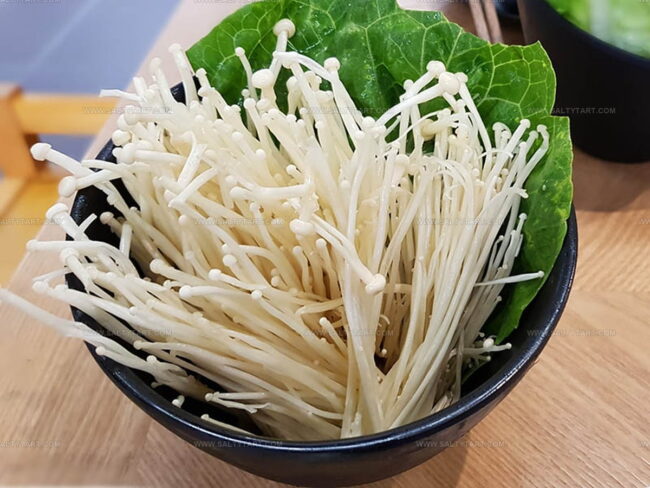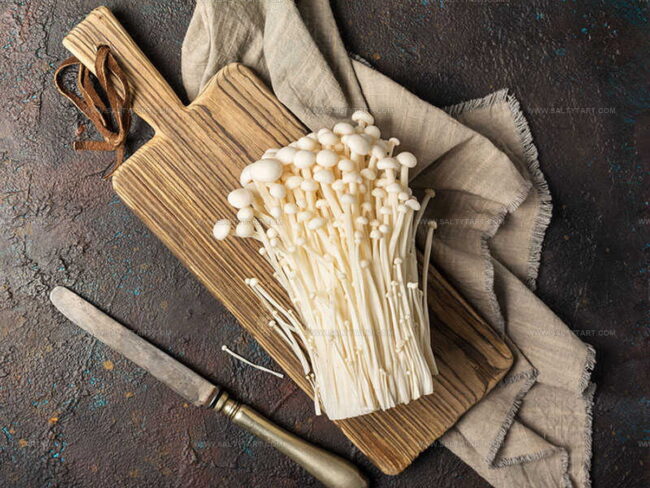What Do Enoki Mushrooms Taste Like? The Subtle Flavor Surprise
Enoki mushrooms, those delicate white fungi with long, slender stems, have intrigued food lovers worldwide for their unique characteristics.
Petite, almost ethereal mushrooms originated in Asian cuisine but have rapidly gained popularity across global kitchens.
Their appearance might seem unassuming, but enoki mushrooms pack a fascinating culinary profile that goes beyond mere visual appeal.
Chefs and home cooks alike appreciate these slender beauties for their distinctive qualities that set them apart from other mushroom varieties.
Understanding their flavor nuances requires diving into a world of subtle complexity and gastronomic delight.
Whether you're a curious cook or a seasoned culinary enthusiast, the journey of exploring enoki mushrooms promises to be an exciting culinary adventure.
Let this guide unveil the delightful secrets of these remarkable fungi.
Enoki Mushrooms: All About Them
Enoki mushrooms, scientifically called Flammulina velutipes, grow in clusters on trees with unique characteristics.
Slender and long, these mushrooms look like spaghetti strands with small caps.
Their texture feels chewy, and the flavor offers mild earthiness with subtle fruity notes.
Farmers grow these mushrooms in special environments filled with carbon dioxide, which helps their stems become white, long, and super thin.
Wild versions look different, sporting shorter stems and bigger caps.
Chefs in Japan, Korea, and Vietnam love using this noodle-like mushroom in many traditional recipes.
Taste Of Enoki Mushrooms
Mild and fruity, enoki mushrooms change texture when cooked.
Fresh ones snap with crunchiness, while heated versions become chewy and soft.
Chefs enjoy mixing them with soy sauce, ginger, lemongrass, and seaweed.
Sushi rolls and hot pot dishes welcome these delicate mushrooms.
Flavor profiles for enoki mushrooms shift depending on preparation.
Raw consumption works well, but cooking brings out deeper tastes.
Sauteing, stir-frying, or roasting helps them shine in salads and side dishes.
Sampling different versions from local markets helps understand their unique characteristics.
Enoki mushrooms carry a subtle flavor that works best in soups.
Their mild taste blends smoothly without overwhelming other ingredients.
Nutritional benefits include protein - around 2g per 70g serving.
Shoppers can find these mushrooms in Asian and Italian grocery sections with some simple searching.
Cooking requires removing the root base before preparation.
Mushroom lovers can enjoy them raw or heated through various methods.
Excellent in:
Versatile and lightweight, these mushrooms offer subtle flavor and nutritional perks for many meal options.
Raw vs. Cooked Enoki: Texture and Flavor Differences
Enoki mushrooms are long, slender mushrooms that bring a delicate look to many dishes, but their taste and texture change quite a bit depending on whether they’re eaten raw or cooked:
Enoki Mushroom Health Advantages
Enoki mushrooms offer more than delicate crunch, they’re also full of health-promoting qualities.
Discover the advantages of adding enoki to your diet.
Very Nutritious Option
Enoki mushrooms pack a powerful health punch with lots of fiber and important vitamins.
Small white mushrooms come loaded with niacin, which helps your body control cholesterol and keep brain signals running smoothly.
These delicate mushrooms deliver a solid dose of pantothenic acid (vitamin B5), crucial for making fatty acids in your system.
Enoki mushrooms also carry plenty of thiamine, supporting healthy nerve cell function throughout your body.
Loaded With Antioxidants
Enoki mushrooms pack a powerful health punch with their high antioxidant content.
These special compounds work hard to shield body cells from potential harm caused by harmful molecules.
Protection against serious health problems like heart issues, cancer, and diabetes becomes stronger when these mushrooms are part of your diet.
Dangerous free radicals meet their match with the strong defense provided by these tiny white mushrooms.
May Slow Down Cancer Growth
Medical scientists have shown early signs that enoki mushrooms might fight cancer in laboratory settings.
Small scientific tests indicate these tiny white mushrooms could stop harmful cell growth.
One earlier lab test showed enoki mushroom extract could block liver cancer cell development.
Another research experiment examining multiple medicinal mushroom types found interesting results about breast and cervical cancer cell movement.
Researchers watched these mushroom extracts potentially slow down cancer cell spread.
Scientists noticed specific chemical compounds from enoki mushrooms might interrupt stomach cancer cell multiplication by significant amounts.
While more research remains necessary, these initial laboratory experiments provide promising hints about enoki mushrooms' potential health benefits.
Could Support Heart Wellness
Studies show enoki mushrooms can boost several heart health markers.
One research study with hamsters revealed interesting results when they consumed enoki mushroom extract or powder.
Compared to control groups, these hamsters experienced lower levels of triglycerides, total cholesterol, and LDL cholesterol.
Laboratory tests highlighted additional heart benefits from enoki mushrooms.
Scientists discovered the mushroom's strong antioxidant properties might help prevent atherosclerosis development.
This condition involves fatty plaque buildup in arteries and increases heart disease risks.
Previous animal experiments also demonstrated that enoki mushroom extract could help reduce blood pressure, cholesterol, and triglyceride levels.
May Help Brain Work Better
Researchers have uncovered interesting connections between enoki mushrooms and brain health.
Scientific studies show potential benefits for mental performance and memory support.
Small research experiments with animals demonstrated promising results about enoki mushroom compounds.
Specific chemicals extracted from these mushrooms appeared to shield brain cells from memory-related medication side effects.
Brain chemistry research highlighted some fascinating outcomes.
Mushroom extract seemed to boost important antioxidant levels and neurotransmitter activity in test subjects.
Scientists also noticed interesting interactions when combining enoki mushroom extract with ginsenosides from ginseng.
Additional animal studies suggested possible improvements for cognitive challenges like Alzheimer's disease.
Rats participating in controlled experiments showed enhanced brain function after receiving specialized mushroom compound treatments.
Small but meaningful scientific observations point toward future research possibilities in neurological health support.
May Strengthen The Immune System
Small white enoki mushrooms pack powerful health benefits.
Research shows these tiny fungi can help strengthen immune defenses.
Scientists studied how these mushrooms work inside animal bodies.
One research project with mice demonstrated that specific compounds from enoki mushrooms made immune cells more active.
Another mouse study focused on respiratory health discovered something interesting.
When mice with a viral illness received enoki mushroom proteins, their airway swelling reduced.
Additional laboratory and animal research highlighted more positive results.
Test results indicated that enoki mushroom extract supports immune system performance.
Researchers observed increased production of immune cells after mushroom extract exposure.
Tasty And Useful In Many Dishes
Small white enoki mushrooms offer a delightful crunch and gentle taste that goes well with many meals.
These tasty mushrooms work perfectly in raw salads or warm dishes like soups, stews, and stir-fries.
Care matters when preparing these mushrooms - wash them well to remove dirt and cut off the bottom stems that can become soggy during cooking.
Chefs often cook enoki mushrooms quickly in a pan with light oil and a sprinkle of salt, sesame oil, or soy sauce for extra flavor.
Cooking Advice For Mushrooms
Enoki mushrooms stay fresh for one week when stored in a paper bag inside the fridge.
Here are some tips for cooking these delicate mushrooms:
First, clean them carefully.
Cut off the tough bottom parts and rinse them well.
When cooking, make sure to wash thoroughly and trim the stems so they don't clump together and turn mushy.
Add rich flavors to the mushrooms.
Simmer them in soy sauce and mirin, a sweet Japanese rice wine, to create a tasty side for rice, soup, or pasta.
Stored in a sealed container in the refrigerator, these seasoned mushrooms will keep for about two weeks.
Warm them in a pan for a few minutes with a pinch of salt and a splash of sesame oil.
Chefs can mix these soft mushrooms into many rice and protein dishes.
Serve them in hot meals.
Enoki mushrooms work great in hot pot soups, stews, and stir-fry recipes.
Cooks love adding them to ramen bowls with soba noodles and miso for an extra burst of flavor and texture.





Mike Reynolds
Founder & Recipe Developer
Expertise
Farm-to-table cuisine, Seasonal recipe development, Sustainable cooking techniques, Food photography
Education
Asheville-Buncombe Technical Community College (A-B Tech)
Associate Degree in Culinary Arts
Mike studied culinary arts with a strong focus on farm-to-table principles and sustainable cooking. His training emphasized the importance of fresh, local ingredients and environmentally responsible practices in the kitchen.
Mike’s food journey began deep in the Blue Ridge Mountains, where weekends at farmers’ markets and home-cooked meals sparked a lifelong obsession with simple, seasonal eating.
After earning his Associate Degree in Culinary Arts from Asheville-Buncombe Technical Community College, he set out to bring farm-to-table cooking into everyday kitchens, without the fuss.
Mike’s philosophy is all about keeping it fresh, unfussy, and full of heart. When he’s not crafting new single-serving recipes, he’s hiking mountain trails, chatting with local farmers, or experimenting with wild ingredients in his backyard kitchen.